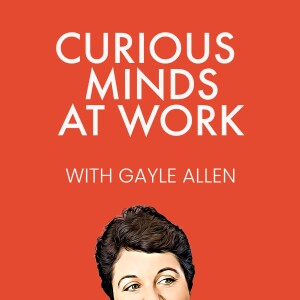
Unhappiness at work is at an all-time high. While some might blame bad attitudes or a lack of motivation, Daniel Cable offers another perspective. He believes that the routines of the modern workplace are simply out of step with how our brains are wired to explore and experiment.
Daniel Cable is Professor of Organizational Behavior at London Business School and author of the book, Alive at Work: The Neuroscience of Helping Your People Love What They Do. He believes our biological urge to learn and discover is what’s needed in today’s fast-paced work world. He also thinks that the organizations that will most benefit from it are those willing to redesign how they operate.
In this interview we discuss:
How our brain’s urge to explore and discover is an asset in today’s workplaces
The fact that most workplaces fail to tap into our innate abilities to innovate and problem solve
The kinds of rewards organizations might gain for customers, workplace cultures, and the bottom line by tapping into what our seeking systems innately crave
How our brain’s reward system is triggered when others take the time to understand our perspective and unique strengths
How trying something new and novel also triggers our brain’s reward system
Why it’s so important for us to see the impact of our work on others -- to understand our purpose
How our seeking system is a feature and not the bug that Henry Ford believed it to be as he built scalable systems for repetitive work
How fear in the workplace can create learned helplessness
The fact that play is an important way for us to learn what we are capable of
Why encouraging employees to bring their best selves to work significantly increases their long-term retention and engagement, while also increasing customer delight
How team members problem solve more effectively when they share in advance when they have been at their best
Why it’s so important that leaders be willing to learn from employee experimentation, since it may not always go as planned -- and that’s part of the learning process
How servant or humble leadership works best in supporting employees’ desire to explore, discover, and innovate
How the role of the leader is to get the most out of their people at work by providing resources, removing obstacles, modeling psychological safety and modeling a growth mindset
How our perceived resistance to change flies in the face of our building flying machines and developing cures for diseases and so much more
Episode Links
@DanCable1
Dan Cable
Dan-cable.com
Jaak Panksepp
Ventral striatum
KPIs
Martin Seligman
Henry Ford
Frederick Taylor
In the Lab of Happy Rats video - Jaak Panksepp
Mihaly Csikszentmihalyi
How to Activate Your Best Self and What Happens When You Do by Dan Cable
Wipro
Harvard Kennedy School
Let Your Workers Rebel by Francesca Gino
William B. Swann
Jeffrey T. Polzer
Osteria Francescana and Massimo Bottura
Creative Change by Jennifer Mueller
KLM Royal Dutch Airlines and KLM Surprise and KLM’s ‘Adios Amigos’ Tweet
Servant leadership
The Power Paradox by Dacher Keltner
Growth mindset and Carol Dweck
If you enjoy the podcast, please rate and review it on iTunes - your ratings make all the difference. For automatic delivery of new episodes, be sure to subscribe. As always, thanks for listening!
view more
More Episodes
CM 157: Kate Murphy On How To Listen
 2020-03-16
2020-03-16
 2020-03-16
2020-03-16
CM 155: Jenny Odell on How to Do Nothing
 2020-02-16
2020-02-16
 2020-02-16
2020-02-16
CM 154: Laura Huang On Finding Your Edge
 2020-02-03
2020-02-03
 2020-02-03
2020-02-03
CM 152: Wendy Wood on the Science of Habits
 2020-01-07
2020-01-07
 2020-01-07
2020-01-07
CM 150: Marc Brackett on Permission to Feel
 2019-12-09
2019-12-09
 2019-12-09
2019-12-09
CM 148: Adam Waytz on the Power of Human
 2019-11-11
2019-11-11
 2019-11-11
2019-11-11
CM 144: Sari Wilde On The Connector Manager
 2019-09-16
2019-09-16
 2019-09-16
2019-09-16
012345678910111213141516171819
Create your
podcast in
minutes
- Full-featured podcast site
- Unlimited storage and bandwidth
- Comprehensive podcast stats
- Distribute to Apple Podcasts, Spotify, and more
- Make money with your podcast
It is Free
- Privacy Policy
- Cookie Policy
- Terms of Use
- Consent Preferences
- Copyright © 2015-2024 Podbean.com





